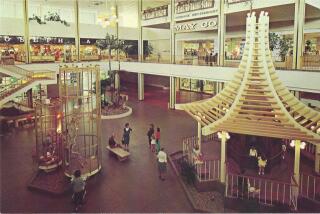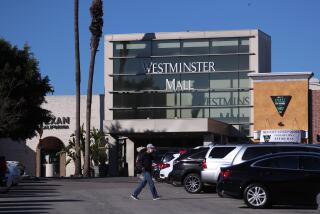Investors Bet Macerich Is Poised to Trump Slump
Consumer spending has slowed and the economy remains stagnant, but you wonât find much concern among the executives and investors of shopping mall owner Macerich Co.
Instead, the stock of the Santa Monica-based real estate investment trust is up about 25% since the start of the year, and its portfolio of giant malls--including the Westside Pavilion in Los Angeles and Los Cerritos Center in Cerritos--continue to churn out revenue and profit.
Investors are banking on the historic ability of large regional malls like the ones Macerich owns to overcome economic slumps with a minimum of damage compared with other retail properties. Shares of other REITs that own big malls, such as Simon Property Group and Taubman Centers, also have posted significant gains this year.
âA drop in retail sales doesnât affect them,â said Ross Nussbaum, a retail securities analyst at Salomon Smith Barney. âWe expect mall REITs to pose solid growth this year despite the [weakening] retail sales environment.â
Mall occupancy rates continue to hover around 90%, and many prime properties keep raising rents. Of course, malls certainly will feel pain in the form of falling rents and higher vacancies if economic conditions continue to worsen and retailers postpone store openings or go bankrupt. But even during the recession of the early 1990s, the vacancy rate at most major regional malls rarely exceeded 10%.
âShopping malls are a pretty solid bet,â said retail consultant Rob York at Fransen Co.
Though REIT shares remain below the record highs reached in the late 1990s, the group in general has benefited this year as investors have shown a renewed appreciation for income-producing securities amid the weak stock market overall. REITs typically pay substantial dividend yields.
The slowing economy is the most recent challenge to face Macerich and its peers. But their regional malls have proven to be retail fortresses, fending off factory outlets, Internet and television shopping and other potential threats.
âNone of those challenges survived,â said Thomas E. OâHern, chief financial officer for Macerich. â[Malls] are safe and climate controlled.â
Macerich keeps a low public profile, but it has emerged as the largest single owner of retail space--about 42 million square feet--in the Western U.S.
On Monday, Macerich shares fell 37 cents to close at $23.85 on the New York Stock Exchange.
Nearly 40% of the companyâs malls are located in California, where retail sales have held up relatively well compared with other parts of the country. But that concentration could work against Macerich if the California economy slows more than expected, say industry analysts.
âMacerich would be exposedâ to more problems, Nussbaum said.
However, Nussbaum and other industry analysts said they expect Macerich, which is scheduled to release its second-quarter earnings Aug. 10, to perform as well if not better than most of its rivals in the months ahead.
âThey are just a good, solid operator,â York said.
The company has focused on building a portfolio packed with malls that are regarded as the dominant shopping center in their respective markets, an important factor in a mallâs long-term survival, say retail industry observers. Dominant malls tend to attract the most credit-worthy of tenants and the most affluent shoppers in an area, according to industry research. About 80% of Macerichâs properties are considered market leaders.
The dominant mall is an even more attractive property in a weakening economy when retailers donât want to take risks on second- and third-tier sites.
In Southern California, Macerich also has achieved market dominance by purchasing clusters of malls on the Westside of Los Angeles and southeast Los Angeles County.
The strategy has allowed the firm to cut operating expenses and take advantage of joint promotions and marketing campaigns. The clusters also give Macerich an edge in dealing with retail tenants that might have once played the competing mall owners against each other.
âIf a tenant needs to be in that market, they need to talk to Macerich,â Nussbaum said.
(BEGIN TEXT OF INFOBOX / INFOGRAPHIC)
Mall Mogul
Santa Monica-based Macerich Co. is the largest shopping mall owner in the Western United States. Its Southern California properties include:
Est. mall sales
Property Location in 2000 (in millions) Lakewood Center Mall Lakewood $346 Los Cerritos
Shopping Center Cerritos 372 Panorama Mall Panorama City 98 Santa Monica Place Santa Monica 157 Westside Pavilion West Los Angeles 257 Source: Macerich Co.
(BEGIN TEXT OF INFOBOX / INFOGRAPHIC)
Separate Ways
Shares of shopping-center owner Macerich Co. have surged this year even as the U.S. stock market overall has slumped. Investors are betting that large regional malls such as those owned by Macerich will fare well despite the dicey economy.
Macerich Gains . . .
Macerich Co. shares on the New York Stock Exchange, monthly closes and latest:
Monday: $23.85
. . . As the S&P; 500 Falls
Standard & Poorâs 500 stock index, monthly closes and latest:
Monday: 1,204.52
Source: Bloomberg News
More to Read
Inside the business of entertainment
The Wide Shot brings you news, analysis and insights on everything from streaming wars to production â and what it all means for the future.
You may occasionally receive promotional content from the Los Angeles Times.










